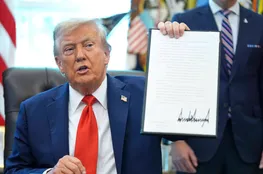WASHINGTON — House Speaker Mike Johnson is responding to demands from the conservative wing of his Republican conference, setting up a vote this week on a bill to fund the federal government for six more months while requiring states to obtain proof of citizenship, such as a birth certificate or passport, for voter registration. Congress needs to pass a stop-gap spending bill by the end of the budget year on September 30 to avoid a government shutdown, just weeks before the presidential election. Combining the proof of citizenship mandate with government funding complicates the bill’s prospects, particularly in the Democratic-controlled Senate.
However, this move could benefit Johnson, R-La., in maintaining his role as House Speaker if Republicans retain their majority. Furthermore, it provides Republicans with an immigration-related issue to challenge Democrats in competitive districts. “Today, House Republicans are taking a critically important step to keep the federal government funded and secure our federal election process,” Johnson said Friday. He stressed Congress’s duty to ensure only American citizens can vote. Democrats are expected to oppose the measure, arguing that avoiding a shutdown requires bipartisan collaboration.
They accuse Johnson of repeating former Speaker Kevin McCarthy’s mistake of pandering to conservatives, a move that led to his reliance on Democratic support for a temporary spending bill and eventually his removal from the Speaker position. Senate Majority Leader Chuck Schumer and Senate Appropriations Committee Chair Patty Murray criticized Johnson’s approach as catering to the hard-right “Make America Great Again” (MAGA) movement. They warned that pursuing this partisan path increases the risk of a shutdown, for which Americans would blame House Republicans. The voter registration measure is popular among House Republicans, particularly in the House Freedom Caucus.
Republicans argue that proof of citizenship would protect the integrity of U.S. elections, a stance Trump has championed. Opponents counter that noncitizen voting is already illegal in federal elections and that requiring documentation could disenfranchise many eligible voters lacking ready access to such documents. In a previous vote, Republicans unanimously supported the bill, while all but five Democrats opposed it. The Biden administration strongly opposes the measure, claiming its justification is easily disproven. Some Republicans, like Sen. Rick Scott, R-Fla., argue that any shutdown would be Senate Majority Leader Schumer’s responsibility if he blocks the bill.
Trump and other Republicans are amplifying concerns about noncitizen voting amid increased migration at the U.S.-Mexico border under Biden’s administration, alleging Democrats aim to add these migrants to voter rolls. However, evidence shows noncitizen voting in federal elections is extremely rare. Another key issue in the short-term spending bill is the duration of the funding extension. House Appropriations Committee Chairman Tom Cole, R-Okla., favors allowing the next president to address top priorities without a spending fight. The House Freedom Caucus, betting on Trump winning the 2024 election, prefers extending funding until after the January inauguration to better secure spending cuts and policy priorities.
Congress returns to Washington on Monday after a five-week recess, needing to pass the short-term bill as both chambers have made little progress on the annual spending bills that keep government agencies operational. The House has passed five out of twelve, while the Senate, taking a more bipartisan approach, has moved eleven through the Appropriations Committee. Meanwhile, House Republicans are pushing bills through with overwhelming Democratic opposition. We invite readers to comment and encourage a thoughtful exchange of ideas on this website. By joining the conversation, you agree to our commenting policy and terms. Register or subscribe to participate. Send questions and comments to the editors.
























